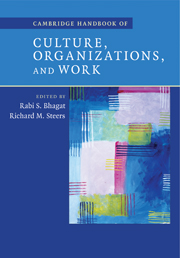Book contents
- Frontmatter
- Contents
- List of figures
- List of tables
- List of contributors
- Preface
- PART I CULTURAL FOUNDATIONS
- PART II CULTURE AND ORGANIZATION THEORY
- 4 Culture and organization design: strategy, structure, and decision-making
- 5 Cross-cultural perspectives on international mergers and acquisitions
- 6 Global culture and organizational processes
- 7 Cultural variations in the creation, diffusion and transfer of organizational knowledge
- 8 Cultural variations and the morphology of innovation
- PART III CULTURE AND ORGANIZATIONAL BEHAVIOR
- PART IV FUTURE DIRECTIONS IN THEORY AND RESEARCH
- Index
6 - Global culture and organizational processes
Published online by Cambridge University Press: 15 December 2009
- Frontmatter
- Contents
- List of figures
- List of tables
- List of contributors
- Preface
- PART I CULTURAL FOUNDATIONS
- PART II CULTURE AND ORGANIZATION THEORY
- 4 Culture and organization design: strategy, structure, and decision-making
- 5 Cross-cultural perspectives on international mergers and acquisitions
- 6 Global culture and organizational processes
- 7 Cultural variations in the creation, diffusion and transfer of organizational knowledge
- 8 Cultural variations and the morphology of innovation
- PART III CULTURE AND ORGANIZATIONAL BEHAVIOR
- PART IV FUTURE DIRECTIONS IN THEORY AND RESEARCH
- Index
Summary
At the end of the twentieth century, concern with globalization and its seemingly continuous intensification led to new stream of research in organizational studies focusing on the changes that globalization brings to organizations. Such studies on the impact of globalization on organizations came from a variety of disciplinary perspectives. To name a mere few directions of inquiry, psychologists introduced questions about identity formation and cultural intelligence in such new global environments (e.g., Erez and gati 2004; Earley, Ang and tan, 2006; Shokef and Erez, 2006), ethnographers observed rituals of global restructuring in organizations (e.g., Ailon-Suadi and Kunda, 2003; Soderberg and vaara, 2003), sociologists analyzed added organizational components (drori, Meyer and Hwang, 2006), and strategy researchers study new forms of organization and integration patterns (ghoshal and Bartlett, 1990; Birkinshaw et al., 2003).
This variety of disciplinary foci resulted in marked fragmentation of the field of globalization studies, between the micro- and macro-, or between the behavioral and institutional. With each discipline developing its respective research tradition, this fragmentation blinded us to the conceptual commonalities and the observed similarities across such disciplinary divides. Today, calls are made from across this divide to expand the respective perspectives and thus to broaden the scope of each research tradition: institutionalists (djelic and Quack, 2008; Powell and Colyvas, forthcoming) and strategy researchers (Redding, 2005) alike call for the use of multidisciplinary approaches to study complex social changes. For structuralists, the call is to seek the microfoundations and to build a theory of action to explain structural change; for organizational behavior researchers the call is to acknowledge the impact of social institutions and to integrate the structural context of behavior into their analyses.
- Type
- Chapter
- Information
- Cambridge Handbook of Culture, Organizations, and Work , pp. 148 - 173Publisher: Cambridge University PressPrint publication year: 2009
- 10
- Cited by



